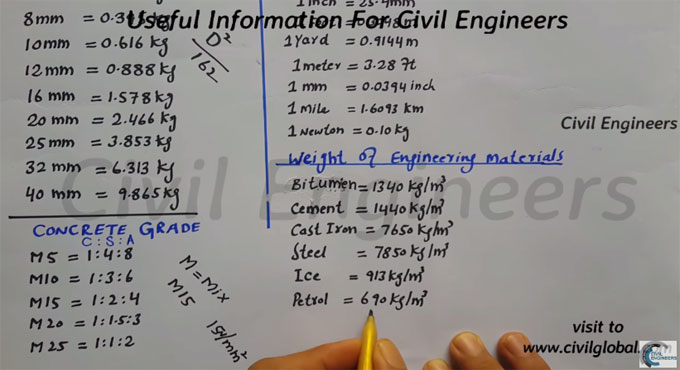
Some vital information and formulas for Civil engineer
In this construction video tutorial, brief explanation is given on various topics like weight of steel per meter, standard conversion factors, concrete grade and weight of engineering materials. These informations are very useful for civil engineers.
Weight of steel per meter :-
For 6 mm steel the weight is 0.222 kg
For 8 mm steel the weight is 0.395 kg
For 10 mm steel the weight is 0.616 kg
For 12 mm steel the weight is 0.888 kg
For 16 mm steel the weight is 1.578 kg
For 20 mm steel the weight is 2.466 kg
For 25 mm steel the weight is 3.853 kg
For 32 mm steel the weight is 6.313 kg
For 40 mm steel the weight is 9.865 kg
The unit of steel is determined with the use of the following formula :-
D2/162
Standard Conversion Factors :-
1 inch = 25.4mm
1 feet = 0.3048 m
1 yard = 0.9144 m
1 meter = 3.28 ft
1 mm = 0.0394 inch
1 mile = 1.6093 km
1 newton = 0.10 kg
Concrete Grade Ratio:- As per ACI standard the following ratios should be maintained for different types of concrete grades.
For M5 concrete grades, the ratio should be 1:4:8 (Cement : Sand : Aggregate)
For M10 concrete grades, the ratio should be 1:3:6 (Cement : Sand : Aggregate)
For M15 concrete grades, the ratio should be 1:2:4 (Cement : Sand : Aggregate)
For M20 concrete grades, the ratio should be 1:1.5:3 (Cement : Sand : Aggregate)
For M25 concrete grades, the ratio should be 1:1:2 (Cement : Sand : Aggregate)
Here, M denotes Mix and M15 means the strength of concrete gained after 28 days as 15N/mm2 (N = newton)
Weight of engineering materials :-
Bitumien = 1340 kg/m3
Cement = 1440 kg/m3
Cast Iron = 7650 kg/m3
Steel = 7850 kg/m3
Ice = 913 kg/m3
Petrol = 690 kg/m3
Water = 1000 kg/m3
To get more information, watch the following video tutorial.
Video Source: Sami Ullah Stanikzai


